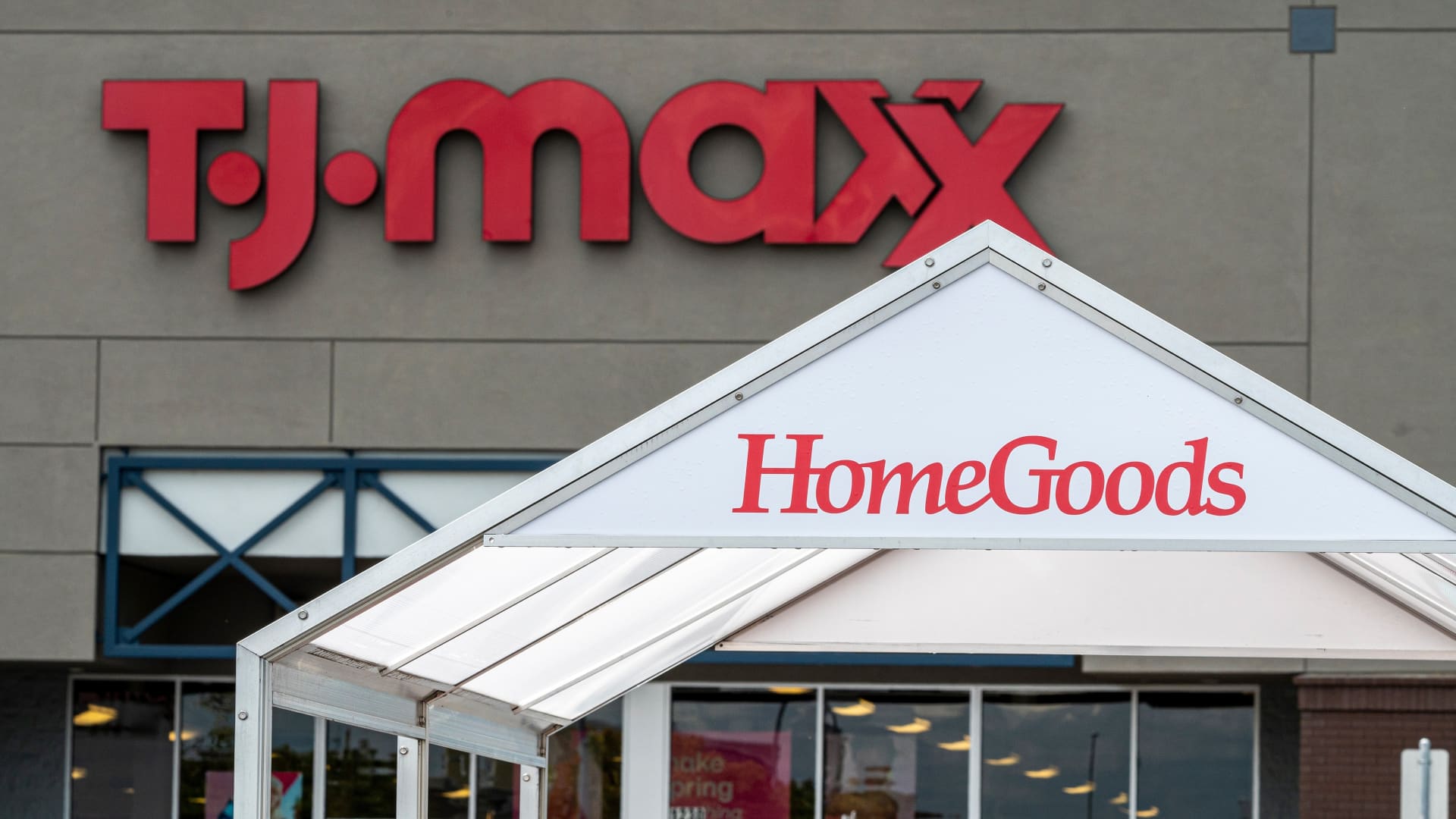TJX Cos. on Wednesday said holiday sales jumped 13% as shoppers hunting for deals flocked to the off-price retailer.
Despite the strong quarter and end to its fiscal year, the company issued guidance that came in light of Wall Street’s expectations as it prepares for tougher comps in the year ahead and an uncertain growth trajectory.
Here’s how TJX did in its fiscal fourth quarter compared with what Wall Street was anticipating, based on a survey of analysts by LSEG, formerly known as Refinitiv:
- Earnings per share: $1.22 vs. $1.12 expected
- Revenue: $16.41 billion vs. $16.21 billion expected
For the quarter ended Feb. 3, the company reported net income of $1.4 billion, or $1.22 per share, compared with $1.04 billion, or 89 cents per share, a year earlier. Excluding an additional week in the quarter, TJX reported earnings per share of $1.12.
Sales rose to $16.41 billion, up about 13% from $14.52 billion a year earlier. The prior-year period’s sales included one fewer week.
For the current quarter, it expects earnings per share of 84 cents to 86 cents, light of the higher end of Wall Street’s expectations of 82 cents to 93 cents, according to LSEG. For the full year, it expects earnings per share of $3.94 to $4.02, compared with estimates of $3.88 to $4.40.
Shares of TJX rose more than 1% in morning trading. The company’s stock was up more than 7% year to date, as of Tuesday’s close.
TJX, which runs T.J. Maxx, Marshall’s, Sierra and HomeGoods, has become the de facto leader in the off-price space for its ability to offer a wide range of premium, branded products and entice higher-income shoppers who are looking for cheaper options in the face of persistent inflation.
Over the last year, it raised its sales and profit guidance numerous times. Ahead of the holiday season, it struck a positive tone as other retailers issued cautious or disappointing guidance amid slowing demand and an uncertain economy.
During the holidays, consumers were laser focused on finding the best deals and discounts, spending record amounts on Black Friday and Cyber Monday and pulling back when promotions weren’t available. TJX was well positioned during the period because consumers were able to shop for a wide range of gifts and at prices that tend to be lower than competitors.
During the quarter, comparable sales at Marmaxx, which includes T.J. Maxx, Marshall’s and Sierra stores, rose 5%, better than the 4.6% uptick that analysts had expected, according to StreetAccount.
While comparable growth stagnated slightly from the previous quarter, TJX’s numbers are up against tough prior-year figures so its two-year growth rate has actually accelerated, retail analyst Neil Saunders, managing director at GlobalData, said in a note.
In the U.S., sales at T.J. Maxx and Marshalls grew 11.7% on top of a 7% increase in the prior year, Saunders noted.
“Most of this was driven by consumers who either were budgeting to spend less overall or wanted to get more for their money. Pleasingly, those opting to shop at T.J. Maxx and Marshalls were not solely focused on price, they also picked the chains for quality and selection,” said Saunders. “This flight to value, which is essentially acting as a recruiting sergeant, was very beneficial over a quarter which is traditionally expensive for most households.”
As other retailers report soft sales for home furnishings amid high interest rates and a sluggish housing market, TJX is bucking the trend at its HomeGoods banner. During the quarter, comparable sales were up 7%, compared with the 4.7% rise analysts had expected, according to StreetAccount.
The numbers are off of slightly easier comparisons, as comparable sales at HomeGoods were down 7% in the year-ago quarter. But the chain is benefiting from consumers who may not be able to buy a new home due to the high interest rates, but are eager to spruce up their existing spaces.
HomeGoods could also be benefiting from the demise of Bed Bath & Beyond’s stores and winning over customers who’d rather shop for home furnishings in a physical retail store than online, where the new Bed Bath now exclusively lives, said Saunders.
TJX’s offering has been better than usual because so many of its suppliers had high inventories throughout 2022 and 2023 and relied on the off-price retailer to help clear that glut. Now that inventories are leveling out across the industry, Wall Street will be keen to see the state of TJX’s offering and if it can sustain the growth and demand it posted over the last year.
TJX’s guidance appears to reflect that concern. In the year ahead, it will be going up against far tougher comps, leaving its growth trajectory uncertain. Some analysts suspect its current fiscal year will see more muted growth as it looks to hang on to the new customers it acquired rather than continuing to bring in new shoppers.
In a research note from Jane Hali & Associates, store checks across New York, Florida, Texas and California showed “fewer notable brand names across luxury, affordable luxury and contemporary.” While inventory levels in the previous quarter were flat, some stores looked to have too much inventory and “too much clearance,” the note said.
As of the end of the quarter, total inventories stood at $6 billion, compared with $5.8 billion at the end of fiscal 2023, the company said. Consolidated inventories on a per-store basis, which includes distribution centers and excludes inventory in transit, TJX’s e-commerce sites and Sierra stores, were up 1%.
Read the full earnings release here.
Don’t miss these stories from CNBC PRO:
- Berkshire Hathaway is one of the most overbought stocks on Wall Street. Here are the others
- Want an Nvidia alternative? These 6 chip suppliers look set to gain big from the AI boom
- Jefferies says buy this under-the-radar software stock with ties to Nvidia and nearly 20% upside
- ‘Opportune time to invest in real estate’: Pros name 5 REITs to buy right now
